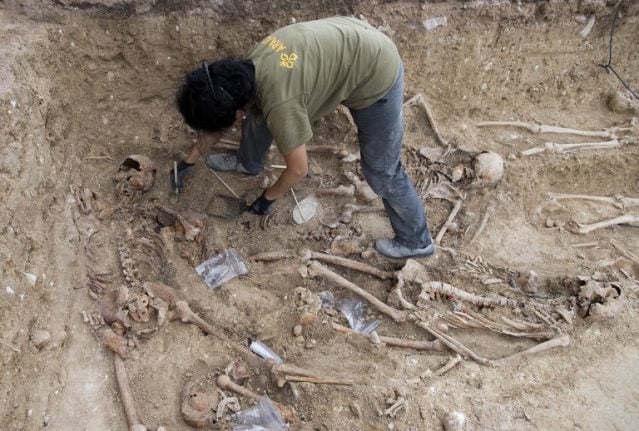Francisco De Llera and Pedro Gallardo had a lot in common. They were both community leaders in their small, rural Spanish towns who dabbled in politics before the regime of Francisco Franco executed them after the Spanish Civil War.
They spent most of the next eight decades in mass graves, as Spain endured almost four decades of dictatorship, followed by the first shaky years of democracy.
In 2016, their stories began to diverge, when a Spanish civil society group, the Asociacón para la Recuperación de la Memoría Histórica (ARMH), got permission to exhume a mass grave in Guadalajara that contained victims of Franco’s regime.
De Llera was one of the 50 people the association recovered. Remarkably, three of his daughters are still alive, all survivors of the Spanish Civil War and the dark, hungry years that followed.
For a radio documentary I reported and presented for Overtone Productions that aired March 19th 2019 on BBC Radio 4, I joined one of De Llera’s daughters, Concha, as she and three generations of her family remembered and reburied Francisco De Llera in a family plot.
“They took my father from us,” Concha De Llera told me, “They left us in the street, they took everything…They insulted us, they called us Reds, they told us 'Your dad is a criminal.'”
Now, the De Llera family has had a chance to say goodbye on their own terms, and they can visit and remember him on their own terms, too, unlike the descendants of the more than 114,000 Spaniards still buried in mass graves, such as Pedro Gallardo.
Gallardo’s granddaughter, Puri Gallardo, began searching for her grandfather’s remains after encountering his name in a history book. She discovered from Spain’s military archives that he was buried in a mass grave in a cemetery in Badajoz.
“When I told my father, ‘Dad, we found grandfather. I know where he is now,’ I saw him cry for the first time,” Gallardo told me.
She visited the cemetery and asked officials to point her to the site of the mass grave listed in the military records. There, she erected a small informal memorial, before requesting an exhumation.
That’s when Gallardo encountered resistance from Badajoz officials, who said that her grandfather is actually buried in another location, affected by subsequent construction works, and that exhuming him is too difficult.
“If I give up, it’s like burying them again,” she said, “it’s forgetting them again and it’s unthinkable.”
In the documentary, I asked Spain’s general director of historical memory, Francisco Martínez, what the minority Socialist government is doing to solve these problems.
While the government has attracted a lot of attention for its proposal to exhume the dictator Francisco Franco’s remains from the Valle de Los Caídos, it failed to get its budget through Spain’s parliament, so funding for exhuming mass graves is still where the previous Popular Party government set it: zero.
That leaves everyone in Spain, including the Gallardo family, waiting until this April’s elections to learn what the next steps will be for Spain’s incomplete recovery from the Civil War.
Lucas Laursen, a journalist based in Madrid, is the presenter of BBC Radio 4's Spain's Lost Generations; Franco's disappeared. The first episode aired on March 18th and can be heard HERE. For more of his reporting follow Lucas on Twitter.
READ MORE: Franco will be exhumed in June despite family opposition



 Please whitelist us to continue reading.
Please whitelist us to continue reading.
I doubt that even 50% of British “ex-pats” who have chosen to move to Spain, know much or even anything about the Spanish Civil War and the Franco era, which didn’t end until Franco’s death in 1975. Maybe the BBC or other British TV channels could produce more programmes on the subject and maybe do something to educate the average British “ex-pat” as to what a nightmare it was for the Spanish population. Never knowing if they or their families would be dragged out of bed during the night and shot and buried in a pit in the forest or tortured by those in power. Maybe a few TV documentaries or even dramatisations regarding this period of history, might stop those people who move to Spain and consider the “locals” as some sort of inferior beings with a mañana attitude to life, in a different light. People are still searching for the bodies of their loved-ones and may never, ever find them. It’s an era that would be nice to forget but never, ever can be. It is also a warning to people who allow a dictator to take over the country – something that appears to be happening right now in the UK!